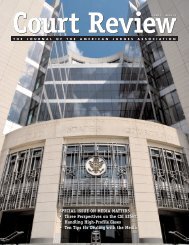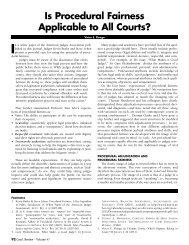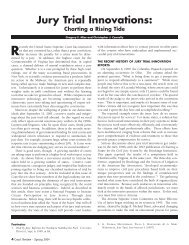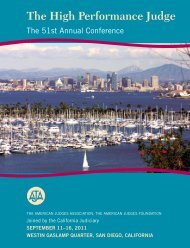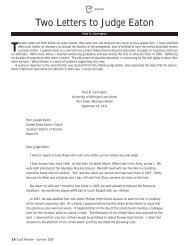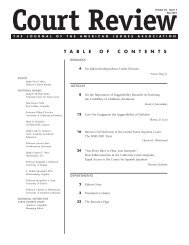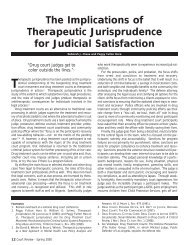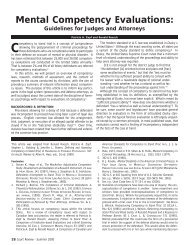President’s ColumnEileen OldsDuring this year as your AJA president, my appreciati<strong>on</strong> andrespect for the role that we play in our courtrooms has amplified.I have been afforded numerous opportunities to speakwith other judges and various community and civic groups togauge their c<strong>on</strong>cerns about our judicial system. Members of thejudiciary and the community alike share a comm<strong>on</strong> c<strong>on</strong>cern forwhat is viewed as increasingly eroding societal values, as evidencedin courtrooms everywhere. Most c<strong>on</strong>versati<strong>on</strong>s eventuallyevolve to discussi<strong>on</strong>s about preventi<strong>on</strong> strategies. Howdid this happen? What needs to be d<strong>on</strong>e? I am c<strong>on</strong>vinced that,as judges, we must actively seek to answer these questi<strong>on</strong>s andembrace an obligati<strong>on</strong> to offer soluti<strong>on</strong>s. Many of our nati<strong>on</strong>’ssocietal challenges are disguised as legal issues <strong>on</strong> court dockets;far too many severely impact our children.As a juvenile and domestic relati<strong>on</strong>s courtjudge for more than 13 years, it should be no surprisethat this is a subject near and dear to myheart; and <strong>on</strong>e that must be closely examined. Itis abundantly clear that there is a proliferati<strong>on</strong> ofsocial problems affecting today’s children andtheir families. Of all the advances the judiciaryhas made in courtroom technology, docket management,courtroom c<strong>on</strong>structi<strong>on</strong>, specializedand problem-solving courts, etc., there is <strong>on</strong>e area that remainsc<strong>on</strong>stant—overrepresentati<strong>on</strong> of minorities and disadvantagedyouth in our criminal justice system. As judges, I believe thatwe have a resp<strong>on</strong>sibility to lend ourselves as participants in thesoluti<strong>on</strong>. We are the gatekeepers. We are uniquely poised andequipped not <strong>on</strong>ly to tackle and to improve the administrati<strong>on</strong>of justice, but also to be more mindful of the social ills thatcripple our nati<strong>on</strong> today.I recently sat in an audience with a group of judges as weheard a presentati<strong>on</strong> <strong>on</strong> the laudable efforts of the Children’sDefense Fund (“CDF”). CDF is a n<strong>on</strong>profit organizati<strong>on</strong> determinedto ensure a successful passage from childhood to adulthood.Its goal is to offer preventive support to poor and minoritychildren before they encounter family diss<strong>on</strong>ance or educati<strong>on</strong>alfailure. A core belief maintained by the CDF is thatwithout practical early interventi<strong>on</strong>, incarcerati<strong>on</strong> is inevitablefor many of America’s children.CDF’s Cradle to Pris<strong>on</strong> Pipeline sm research identified a gravecrisis affecting many minority children. They are abused, aband<strong>on</strong>ed,and impoverished at greater rates than the general populati<strong>on</strong>.They are born to teen parents, born underweight, andmedically uninsured. They languish in poverty, foster care, anddrug houses. Disadvantaged at birth, these neglected childrenwill most likely become America’s future pris<strong>on</strong>ers. Accordingto statistics provided by the CDF, African-<strong>American</strong> boys bornin 2001 have a <strong>on</strong>e in three likelihood of becoming incarcerated.Latino boys have a <strong>on</strong>e in six chance of impris<strong>on</strong>ment.Underprivileged children are enmeshed in family unreadiness.The majority, rather than being raised by resp<strong>on</strong>sible parentsor positive role models, are negatively influenced by televisi<strong>on</strong>images, peers, and gang members. As a result, itbecomes increasingly difficult to break free fromtheir hampered envir<strong>on</strong>ment. Ec<strong>on</strong>omic disparities,the lack of quality living standards, healthcare, and educati<strong>on</strong> create a divide. Success forthese bruised youths is obstructed and replacedwith learning impediments. The numbers ofthose impacted are staggering, and unless thisnati<strong>on</strong>al crisis is remedied, America’s Cradle toPris<strong>on</strong> Pipeline sm will c<strong>on</strong>tinue. (You can read thefull CDF report <strong>on</strong>line at http://www.childrensdefense.org/site/PageServer?pagename=c2pp.)The judges’ acknowledgement is therefore a necessary comp<strong>on</strong>entto bring awareness and attenti<strong>on</strong> to c<strong>on</strong>tributing factorsthat bring juveniles before the court. While we must speakwith clarity and authority to those before the court, we alsohave the resp<strong>on</strong>sibility to promote innovative approaches toaddress the underlying inequities.Radical acti<strong>on</strong>s produce extreme changes. I am c<strong>on</strong>fidentthat the cradle-to-pris<strong>on</strong> pipeline can be derailed and that someof these sociological ills can be healed. I urge your support inactively participating and working together with policy makers,parents, community leaders, and others to identify viable soluti<strong>on</strong>s.We are in an undeniable positi<strong>on</strong> of relevance to theseissues. Through effective partnerships we can unite offeringhope, new chances, and a better life for our children. Togetherwe can create opportunities for new beginnings—untaintedbeginnings that outshine past negative experiences anddestructive influences.Court Review - Volume 44 3
A WHITE PAPER OF THE AMERICAN JUDGES ASSOCIATIONTHE VOICE OF THE JUDICIARY ®PROCEDURAL FAIRNESS:A KEY INGREDIENT IN PUBLIC SATISFACTIONKevin Burke & Steve Leben<strong>American</strong>s are highly sensitive to the processes of procedural fairness. It is no surprise,then, that the percepti<strong>on</strong> of unfair or unequal treatment “is the single mostimportant source of popular dissatisfacti<strong>on</strong> with the <strong>American</strong> legal system.” 1Even first-graders react negatively to a situati<strong>on</strong> where a mother punishes her child for abroken vase without c<strong>on</strong>sulting a witness first. This negative reacti<strong>on</strong> signifies powerfullythat children are already sensitive to the principles of procedural fairness. 2 If childrenin early elementary school already react negatively to perceived violati<strong>on</strong>s of proceduralfairness, it is <strong>on</strong>ly that much more imperative to address the needs of the adults whoappear in the courts to fight for custody of their children, file bankruptcy, c<strong>on</strong>test a speedingticket, or resp<strong>on</strong>d to allegati<strong>on</strong>s of fel<strong>on</strong>ious criminal behavior.<strong>Judges</strong> can alleviate much of the public dissatisfacti<strong>on</strong> with the judicial branch by payingcritical attenti<strong>on</strong> to the key elements of procedural fairness: voice, neutrality, respectfultreatment, and engendering trust in authorities. <strong>Judges</strong> must be aware of the diss<strong>on</strong>ancethat exists between how they view the legal process and how the public before them viewsit. While judges should definitely c<strong>on</strong>tinue to pay attenti<strong>on</strong> to creating fair outcomes,they should also tailor their acti<strong>on</strong>s, language, and resp<strong>on</strong>ses to the public’s expectati<strong>on</strong>sof procedural fairness. By doing so, these judges will establish themselves as legitimateauthorities; substantial research suggests that increased compliance with court orders anddecreased recidivism by criminal offenders will result. <strong>Procedural</strong> fairness also will lessenthe difference in how minority populati<strong>on</strong>s perceive and react to the courts.Many people have little c<strong>on</strong>tact with the court system in their daily life, so it is understandablethat they feel overwhelmed and lost when they are c<strong>on</strong>fr<strong>on</strong>ted with an unfamiliarlegal system. This lack of knowledge about the court has resulted in a state ofambivalence—accentuated by the lack of depth to most news coverage of the courts andthe misinformati<strong>on</strong> of entertainment televisi<strong>on</strong>. In many ways, procedural fairnessbridges the gap that exists between familiarity and unfamiliarity and the differencesbetween each pers<strong>on</strong> regardless of their gender, race, age, or ec<strong>on</strong>omic status. It is a valuethat the <strong>American</strong> public expects and demands from judges, and many judges haveembodied the c<strong>on</strong>cepts of procedural fairness in their everyday lives. While the <strong>American</strong>© 2007 by Kevin Burke and Steve Leben. The authors grant you permissi<strong>on</strong>to reprint this article for any educati<strong>on</strong>al purpose.Footnotes1. Jas<strong>on</strong> Sunshine & Tom R. Tyler, The Role of <strong>Procedural</strong> Justice andLegitimacy in Shaping Public Support for Policing, 37 LAW & SOC’YREV. 513, 517 (2003).2. Robert J. MacCoun, Voice, C<strong>on</strong>trol, and Bel<strong>on</strong>ging: The Double-Edged Sword of <strong>Procedural</strong> <strong>Fairness</strong>, Center for the Study of Lawand Society Jurisprudence and Social Policy Program, JPS/Centerfor the Study of Law and Society Faculty Working Papers, Paper30, at 14 (May 5, 2005), available at http://repositories.cdlib.org/csls/fwp/30/.4 Court Review - Volume 44



